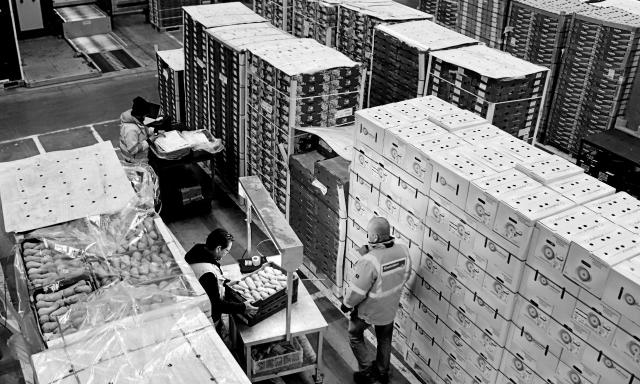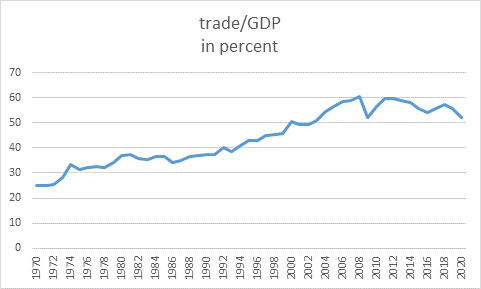

 Article
Article

 The Global Alliance for Trade Facilitation promotes inclusive economic growth by giving developing and least developed countries better access to international trade. A neutral convener between government and business, it provides technical support and guidance, channeling global business knowledge. It is a leading public-private partnership.
The Global Alliance for Trade Facilitation promotes inclusive economic growth by giving developing and least developed countries better access to international trade. A neutral convener between government and business, it provides technical support and guidance, channeling global business knowledge. It is a leading public-private partnership.

Insights from
Written by
Promoting Inclusive Economic Growth
Recent disruptions to global supply chains underline the interconnected nature of the global economy and the importance of keeping goods moving. However, cargo shipments around the world, including food and health goods, still languish needlessly for lengthy periods in warehouses, in ports, and at border crossings due to red tape and outdated, manual procedures. In tackling bureaucratic overreach and modernizing border processes, trade facilitation has significant social impact. When trade is simpler, faster and more cost-effective, more trade happens, unlocking inclusive economic growth that can benefit government, business and consumers.
Unnecessary delays have a particularly chilling effect on the micro-, small- and medium-sized enterprises (MSMEs) that form the economic backbone of developing and least developed countries but often find themselves virtually excluded from international trade. They cannot afford to risk their goods being held up for days, weeks or even months, often for obscure reasons. For food producers it could mean looking on in frustration as their fresh fruit and vegetables spoil on a quayside. There is a broad consensus that such businesses, many of them owned by women, would benefit most from trade facilitation.
Global Alliance for Trade Facilitation
In 2017, policy-reform efforts crystalized with the entry into force of the landmark World Trade Organization Trade Facilitation Agreement (TFA), which contains provisions for expediting the movement, release and clearance of goods. The TFA acknowledges that the developing and least developed countries with the most to gain from better access to international markets would require time and assistance in meeting their commitments.
The Global Alliance for Trade Facilitation (the Alliance) was created by the United States and other donors on the basis that public-private partnership is the best way to deliver sustainable change, with governments and businesses working together to mutual advantage.
The Alliance supports governments in least developed and developing countries in implementing the TFA. Alliance projects cut through red tape and end costly delays at borders by bringing together governments and businesses of all sizes as equal partners to deliver targeted, measurable trade reforms.
The cornerstone of every project, from inception to completion, is public-private partnership. Every Alliance project stems from a joint recognition of the need to target identified obstacles to trade and a willingness to work together to eliminate them. Acting as a neutral convener and catalyst between government and business, the Alliance builds consensus through workshops, public-private dialogues and public-private working groups.
Through these mechanisms, mutually beneficial partnerships are built, achieving measurable results in terms of reductions in the time and cost of trade and while increasing trust, predictability for business and transparency.
The Alliance also provides technical support and guidance throughout project development and implementation. It channels knowledge from global businesses to countries where it can have the greatest impact. The involvement of local companies forms a key aspect of every project, helping to ensure that they share in the benefits of this knowledge transfer and the design and implementation of trade-reform projects.
After almost seven years in operation, the Alliance has delivered trade reforms developed through public-private partnership across the developing world. Through digitalization and other best practices, businesses are trading more easily thanks to streamlined and more predictable processes. Governments are saving time and resources through modern trade procedures while still safeguarding their borders. Ultimately, these initiatives are boosting trade competitiveness and business conditions, which are key drivers of inclusive economic growth and poverty reduction.
For example:
We live in an unprecedented era of globalization as far as international trade is concerned. Especially since the 1990s, which saw anticipation of China’s 2001 entry into the World Trade Organization, cross-border trade flows have expanded rapidly. Currently, trade (exports and imports) amounts to roughly 50 percent of world GDP (see below). Tariffs, the most visible hindrance of international transactions, are historically low. There are around 300 free trade agreements, up from fewer than 50 in 1990. In this context, some refer to the current period as one of “super globalization.”1

Large firms and multinational corporations dominate cross-border trade; they are responsible for the lion’s share of trade. Elaborate international transactions constitute the sophisticated supply chains that make global production possible. To a large extent, products are assembling components from around the globe, and in the process, they cross borders multiple times.
The COVID-19 crisis has brought to the fore the critical role of supply chains, as well as the cost of disrupting them. The Ukrainian crisis and the sanctions against Russia have added to this already explosive cocktail, underscoring how thinly stressed international production lines sometimes are.
The Global Alliance for Trade Facilitation and the WTO realize that there is limited appetite for another round of multilateral tariff reductions. Since tariffs by themselves are already relatively low, these organizations choose to focus on other costs (red tape, delays in border crossing, etc.) that hamper international trade and amplify current supply-chain-induced shortages. Trade facilitation should directly address those costs.
The focus of the Alliance is on developing and least developed countries and assisting them with the implementation of trade-facilitating measures through technical and financial assistance. The Alliance reminds us that international trade for emerging and developing economies can be a way to participate in the global economy and upgrade those economies’ production, hence is a gateway to economic growth. The Alliance also reminds us that many developing countries’ companies that participate in trade are not oversized multinational corporations. They may lack the know-how, manpower and resources of multinational corporations. In addition, the institutional capacity of the governments in those countries is also more constrained.
This provides a space for a public-private partnership to try to make a difference.
The Darden School of Business’ Institute for Business in Society partners with Concordia and the U.S. Department of State Secretary’s Office of Global Partnerships to present the annual P3 Impact Award, which recognizes leading public-private partnerships that improve communities around the world. This year’s award will be presented at the Concordia Annual Summit the week of 19 September 2022. The five finalists will be highlighted on Darden Ideas to Action on Fridays leading up to the event.
This article was developed with the support of Darden’s Institute for Business in Society, at which Maggie Morse is director of programs.
Debaere is a leading international economist, with a focus on international trade, multinationals and trade policy. His work addresses fundamental questions about the extent to which trade theories can explain actual international trade patterns. He has also examined the specific impact of trade policies on trade flows and international prices, as well as on the operations of multinational corporations. In recent years, Debaere has also been researching the economics of water.
B.A., KUL, Belgium; M.A., Ph.D., University of Michigan, Ann Arbor
Global Alliance for Trade Facilitation: Inclusive Economic Growth